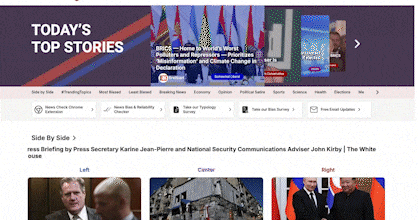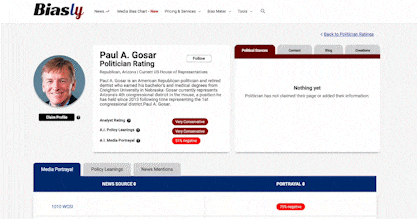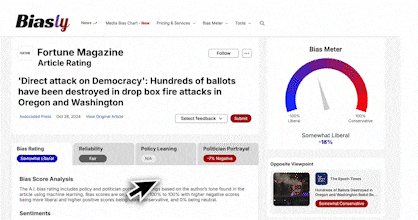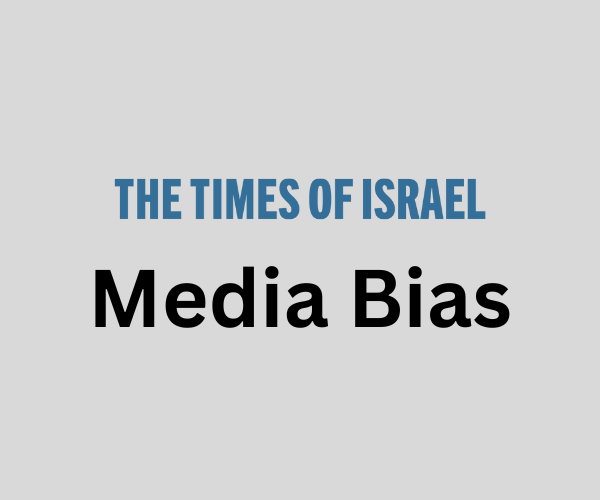
Launched in 2012, The Times of Israel has established itself as a prominent news source in Israel and the Middle East. UK-born Israeli journalist David Horovitz founded the platform alongside several colleagues. Based in Jerusalem, The Times of Israel provides coverage of topics throughout the Middle East and Western world, including politics, culture, and society as a whole.
As an internationally focused news platform, it is interesting to see how other countries view Israel. According to data from Pew Research, Americans have a mostly favorable view of Israel, especially Republicans and older individuals. Younger adults and Democrats generally have a more unfavorable view of Israel. These international views of Israel may have a profound impact on the type of news The Times publishes, as well as the perspectives that many authors will show.
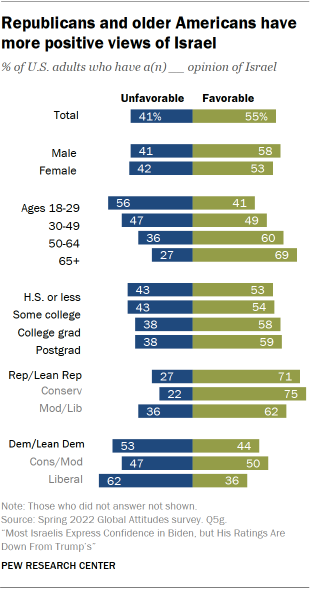
Source: Pew Research
In this article, we will analyze the newspaper’s coverage and editorial decisions to determine if there is a discernible political bias in their reporting. Through our analysis, we hope to provide a comprehensive answer to whether The Times of Israel is biased and shed light on the factors that contribute to media bias in general.
How Does Biasly Rate News Sources?
Biasly’s algorithms produce bias ratings to help provide multiple perspectives on given articles. Biasly has analyzed 200,000+ news articles from more than 3,200 news sources through our A.I. technology and team of political analysts to find the most factual, unbiased news stories.
Biasly determines the degree of political bias in news sources by using Biasly’s Bias Meter Rating, in which Biasly’s team analyzes media sources’ reliability and bias and produces three scores, a Reliability Score that measures the accuracy of media sources; an A.I. Bias Score, evaluated by A.I.; and an Analyst Bias Score evaluated by political analysts. These scores are rated based on seven rating metrics including Tone, Tendency, Diction, Author Check, Selection/Omission, Expediency Bias, and Accuracy. These metrics help our analysts to determine the political attitude of the article.
Our A.I. machine-learning system employs natural language processing and entity-specific sentiment analysis to examine individual articles and determine their bias levels. By analyzing the key terms in an article such as policies, bias phrases, political terminologies, politicians, and their nicknames, the algorithms can rate the attitude of the text. Bias scores range from -100% and 100%, with higher negative scores being more liberal, higher positive scores being more conservative, and 0% being neutral.
Is The Times of Israel Politically Biased?
Before we begin, we need to discuss bias. Bias is a natural function of humans, and we can express it both consciously and unconsciously. Bias is one of the most fundamental forms of pattern recognition in humans. This isn’t to lower the bar and say that “all things are biased,” but to explain the process in which we may come to trust certain news organizations that display patterns of coverage.
On the media’s part, there is an incentive to retain audiences, encourage them to purchase subscriptions, and rate products positively. Bias is a two-way street, people want to see news stories about things they care about, and the media needs viewers to continue their operations. This creates a positive feedback loop that influences what stories are covered and from what perspective. This also explains the actions of more liberal news organizations.
Biasly’s rating for The Times of Israel gives the paper a Computer AI Bias Score of Somewhat Liberal, a score generated by its AI-based algorithms. Biasly’s AI bias analysis focuses on the leaning of tone, opinion, and diction of the author, and, their respective tendencies. For example, Biasly’s AI rated its Anti-Discrimination Laws policies as Medium Conservative but rated its Criminal Justice policies as Medium Liberal. It seems that the policy positions of the The Times of Israel are very nuanced, but generally have more conservative perspectives.
Biasly has assigned a Somewhat Liberal score as the Analyst Bias Score. Typically, alongside the Computer Bias Score, Biasly presents an Analyst Bias Score. This score is curated based on a review of at least 15 articles by a team of analysts representing liberal, moderate, and conservative viewpoints. Different types of bias in articles and preferences for liberal or conservative politicians and policies all factor into generating these scores. The more articles the Biasly analyst team reviews and rates, the more precise the analyst score becomes.
Analysis of Bias in The The Times of Israel Online Articles
When determining bias, some of the most common metrics used include Tone, Tendency, Author, Diction, and Expediency Bias, which are the primary metrics we’ll focus on below.
- Tone: This represents the attitude of the writing, formed distinctively but related to the author’s word choices or diction.
- Diction: The specific words chosen by the writer.
- Author: A metric related to the article’s author, taking into account their history of stance on issues based on past articles and social media posts.
- Tendency measures how consistently an author shows bias in their work, including factors like their tone and perspective.
- Expediency Bias relates to the immediate impression created by elements like the article’s headline, images, or summary, indicating if they favor a particular viewpoint.
Tendency and tone can widely vary from article to article depending on the author and topic. In one of the Time’s more central articles, examining the tendency and tone can help readers determine any existing biases. We can do this by determining the coverage of each topic, and if the author presents an issue more positively or negatively. Overall, this article showed mostly unbiased content, but there were a few instances that clearly showed bias against President Donald Trump. Though it acknowledges that Trump is gaining Muslim support because of Joe Biden’s and Kamala Harris’s actions, it mentions that this is “despite Trump banning immigration from some Muslim-majority countries in his first term as president.” The article showcased both campaigns’ strengths, weaknesses, failures, and victories. There was a slight bias towards Democratic politicians and against Trump simply from the perspective they take. The quotes they used from Harris were much more critical and strong attacking Trump than any of the quotes from Trump. The author also spoke very highly of Michelle Obama, referring to her as very popular and successful.
By using quotes selectively, articles can display what biases are present. Following the 2024 Presidential Election coverage, The Times published a piece displaying the endorsements Trump had received from world leaders. The tone and tendency of this article leaned toward Trump and his victories, but more obvious was the selection of quotes used by the author. Quotes of endorsement and congratulations were sourced from Israeli Prime Minister Benjamin Netanyahu, President Isaac Herzog, Finance Minister Bezalel Smotrich, National Security Minister Itamar Ben-Gvir, New Hope chairman Gideon Sa’ar, Foreign Minister Israel Katz, National Unity party leader Benny Gantz, and Minister for Jerusalem Affairs and Jewish Heritage Meir Porush. All important Israeli leaders, it seems as though this article is working to convey the mass Israeli support for President Trump.
In contrast, an article criticizing a Trump rally demonstrated a clear bias against Trump and his supporters, as represented by its diction. The article was full of strong emotional language, claiming instances of racism, antisemitism, anti-Israel sentiments, Holocaust-denying, bigoted rhetoric, violence, and nativism. Though the accuracy and basis of these claims can be debated, the author’s use of these terms heightens the emotions of the audience and persuades them to think a certain way.
The headline of an article often represents the type of expediency bias a source has. In October 2024, The Times of Israel published two articles on Donald Trump’s Madison Square Garden rally that demonstrate a clear bias against Trump and his supporters. The headlines read “Trump pumps New York City crowd at rally peppered with vulgar, racist attacks”, and “Trump’s MSG rally features vows to back Israel, antisemitic joke and nativist rhetoric.” The tone and strong diction discussed earlier immediately show its audience that this article has clear biases.
The photographs used in these two articles also reveal the paper’s bias:
- One photo used is an unflattering and crazed-looking Tucker Carlson, a Trump ally who is repeatedly condemned in the article.
- Two other photos offer comparisons of the Trump rally to Nazi rallies.
- Another photo shows an elegant and composed Kamala Harris.
These photographs attempt to shed a negative light on Trump and his campaign while raising up his opponent Harris.


Source: The Times of Israel Source: The Times of Israel


Source: The Times of Israel Source: The Times of Israel
Investigating the author of a piece of journalism gives insight into possible potential biases. It can be concluded that a large portion of journalists for The Times disapprove of Prime Minister Benjamin Netanyahu, and have left-leaning tendencies in regard to situations involving Netanyahu. Founder David Horovitz often posts stories disapproving of Netanyahu on his Twitter page, as do many of his reporters including Ron Kampeas, Sharon Wrobel, and Lazar Berman.
Op-ed: Under Netanyahu, Israel is in existential danger https://t.co/7PEs8seK3c via @timesofisrael
— David Horovitz (@davidhorovitz) September 4, 2024
Netanyahu firing Galant is not a surprise. Given the bad blood between them and Netanyahu’s desire to squelch any and all dissension within the coalition ranks, it was inevitable. But the timing is notable for a few reasons.
— (((Michael Koplow))) (@mkoplow) November 5, 2024
Another 110 business execs join appeal warning Netanyahu about harm to democracy https://t.co/3wsigPEsqP via @timesofisrael @netanyahu #israel #startups
— Sharon Wrobel (@SharonWrobel1) December 22, 2022
PM Benjamin Netanyahu asks Ambassador Michael Herzog to extend his three-year term until US president-elect Donald Trump takes office on January 20, says the Prime Minister’s Office.
Netanyahu will announce a new envoy tomorrow.
— Lazar Berman (@Lazar_Berman) November 7, 2024
Though it is clear that these authors have very nuanced views of Netanyahu and his policies, they often repost and write their own tweets that tend to show the Prime Minister in a negative light. Every one of their platforms focuses on Israeli affairs and news, often including activism and stories about social change relating to Israel and the current conflict with Palestine.
Analysis of The Times of Israel Opinion Articles
Regarding The Times of Israel’s opinion articles, biases, and perspectives are much more varied. Various staff members cover both conservative and liberal points of view.
Founder David Horovitz occasionally writes for the platform and recently shared his opinion about Benjamin Netanyahu’s firing of Yoav Gallant, claiming it was “reckless, divisive and dangerous to Israel.” This was a very interesting op-ed to read as Pew Research showed that many Israelis share Horovitz’s views on the relevant politicians.
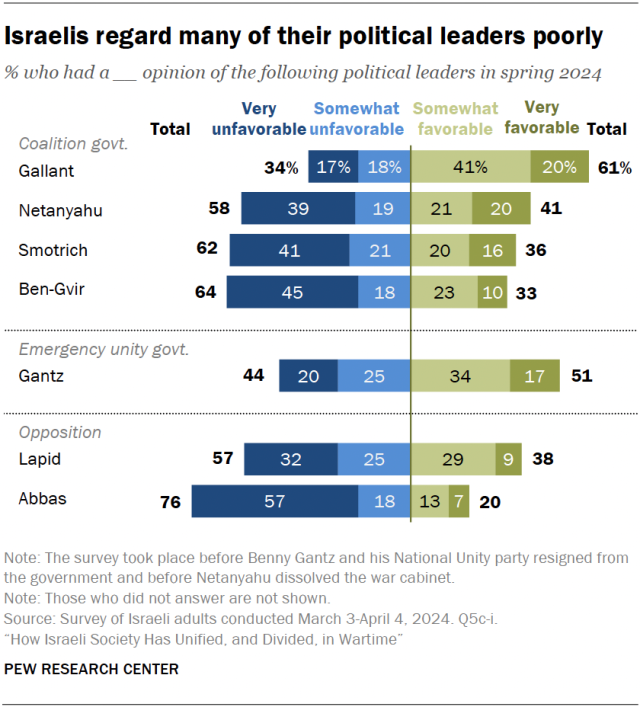
Source: Pew Research
Though many of the previous online articles from The Times lean left, a recent opinion article from a Jewish American author provided a much more right-leaning perspective. Ellen Just Braffman provided a unique and comprehensive opinion article in which she both criticized and praised Donald Trump for his actions. Braffman was very critical of Trump’s actions on Jan. 6th, 2021, however, her opinions quickly changed following the Oct. 7th attack on Israel. After supporting and joining Nikki Haley’s team, Braffman decided she would side with politicians on the right, including Trump, who support her view on the Israel-Hamas conflict. Braffman’s perspective had much bias toward the right because of her stance on the Middle East, but she also gave some opinions that leaned left. Her nuanced opinion on Trump shows how The Times gives voice to people of many different perspectives.
On the whole, it seems as though The Times’s opinion articles focus on sharing opinions and news that aligns with Israeli perspectives. Though opinions are often biased through that narrative, The Times attempts to showcase a variety of opinions that sometimes contradict each other.
Who Owns The Times of Israel?
The platform’s founder, David Horovitz, also serves as its Editor. Horovitz envisioned a platform to report on Israel, the Middle East, and the Jewish world with a commitment to fairness and accuracy. The platform contains dedicated sections for Start-Up Nation Central, highlighting Israel’s tech scene, and Ops & Blogs, featuring opinion pieces by various contributors.
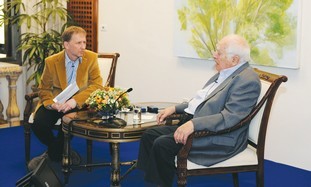
Horovitz (left) interviewing Bernard Lewis for The Jerusalem Post in 2011
The Times of Israel takes an international approach to news, reaching outside of the Middle East to cover topics relevant to audiences all over the world. News is offered in multiple languages, including English, French, Arabic, and Persian. Though it is committed to covering information in the Jewish World and Diaspora, it sets itself apart by providing multiple often conflicting viewpoints and opinions, representing its commitment to diverse and multicultural news coverage.
How to Evaluate and Uncover Bias
It can often be difficult to tell if the news you watch is biased. If you have settled on a news channel, it’s usually because you trust the information you are gaining. Unfortunately, many trust the information they are hearing because it confirms what they already believe. This is referred to as “confirmation bias.” It is important to challenge your beliefs and get third-party verification that what you are hearing is the full story. This is why we recommend using Biasly to compare different news stories side-by-side using our bias ratings to figure out what both sides think of a political issue.
Though a fairly diverse platform, The Times of Israel recognizes its bias towards Israeli causes and perspectives. Serving as one of Israel’s most prominent news sources, The Times focuses on its Jewish audience and often disregards viewpoints contrary to many Jewish and Israeli beliefs. As a whole, The Times of Israel serves as a centrist news source with prominent left leaning tendencies.






















